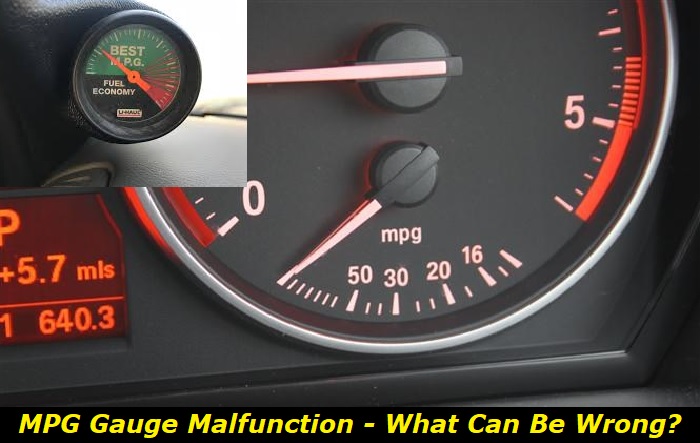The MPG (miles per gallon) gauge poses a very important function in your vehicle. This gauge allows drivers to measure the amount of fuel economy their vehicle is getting and provides a better understanding of your car's performance.
Essentially, this tool helps you determine when it is time to fill up your tank so that you don't run out of gas while on the road. It also gives you an indication of how well your car is doing overall in terms of fuel efficiency. However, this benefit gets thrown out of the road when this crucial piece of equipment suddenly malfunctions.

How It Works
The MPG gauge works by monitoring the amount of fuel that goes from the fuel tank into the engine cylinders and determining how far the vehicle travels with that specific amount. As gasoline pumps are designed differently, each vehicle has a different reading depending on its design characteristics. For instance, if a driver uses higher octane gas or diesel in their car, they will experience different readings on their MPG gauge.
Having an accurate MPG gauge helps drivers make well-informed decisions when it comes to purchasing new vehicles or making adjustments to the ones they already own. It can reveal whether a vehicle's fuel efficiency has decreased significantly, allowing drivers to adjust accordingly and save money in the process. In addition, this gauge is beneficial for those who are looking for ways to reduce their carbon footprint as it gives them a clear indication of just how much gas consumption they are using on a daily basis. Furthermore, understanding your vehicle's fuel economy can help you extend its life by avoiding overusing or underusing certain parts that may require repair if not properly maintained.
Most Common Causes of MPG Gauge Malfunction and How to Fix Them
Since the information displayed in your MPG gauge is influenced by many parts in your vehicle, diagnosing the reason for its incorrect readings should begin by checking your vehicle for the following problems:
1. Malfunctioning MPG Gauge
When diagnosing a malfunctioning MPG gauge, the best way to start is with the gauge itself or the instrument cluster of your vehicle. It's possible that its software is already glitching or there may be power issues triggering the fault. Visual checking of the instrument cluster is necessary to identify any visible signs of damage or loose connections. If this fails, then a test light or multimeter can be used to check if the circuits are receiving power and ground correctly.
The next step would be inspecting the wiring harness that connects to your fuel tank sending unit. It's possible that it has become corroded over time, leading to faulty readings from the gauge. To verify this, you can disconnect the harness and use an ohmmeter or multimeter to measure resistance levels in the wire for any irregularities.
If you come up empty-handed in both tests, then it may be a problem with your car's computer system. This could include an ECU malfunction, data errors or corrupted software. To identify if this is the case, you will need to connect an OBD2 scanner tool and use it to read any trouble codes that may be present in the computer's memory.
Once the cause of the problem has been determined, you can start to carry out repairs. If it's a wiring issue, then you will need to replace damaged parts or rewire them into position. For computer-related issues, resetting the system could solve your problems but if that fails then a professional mechanic should be consulted for further help with reprogramming the ECU or updating its software. If all else fails and your gauge still won't work after extensive troubleshooting, then replacing it may be your only option.
As you can see, diagnosing a malfunctioning MPG gauge requires the right knowledge and testing equipment. So, if you lack any of them, be sure to bring your auto to a qualified technician for a more thorough assessment.
2. Faulty Sensor
When troubleshooting why a car's MPG gauge is not displaying an accurate reading, faulty fuel and/or mass airflow sensors should be considered as potential culprits. To diagnose these issues, first use a visual check-up to assess the overall condition of both components and check for any noticeable signs of damage that may have occurred. Then, observe if there are any common symptoms present such as engine hesitation or stalling during acceleration, rough idling or vibration at idle speed, and poor performance in general as these are all indicative of an issue with the sensor. Using specialized tools like multimeters, oscilloscopes and diagnostic computer systems can help pinpoint exactly which component is causing the problem.
If it turns out that either one of these sensors needs replacing, then their exact model and specific part number will need to be identified. The fuel sensor is typically located in the fuel tank while the mass airflow sensor is usually mounted in the air intake system near the throttle body.
Replacing these components generally involves removing several parts of the vehicle before being able to access them, so a good understanding of automotive repair should be acquired beforehand. Once replaced with an OEM-specified part, then testing and adjusting as necessary should restore accurate MPG readings on the gauge.
3. Vacuum Leak
A vacuum leak can be another cause for your inconsistent MPG readings. This type of leak is often caused by faulty or worn-out gasket seals and hoses in the engine bay. It can also be caused by other problems like a damaged carburetor. To determine if this is indeed the issue, you should check for any possible signs of a vacuum leak using a few tools and methods.
One method of testing is to use an automotive stethoscope. Place one end on each side of the engine compartment to listen for any hissing sounds that could indicate a vacuum leak. A smoke machine can also be used to help diagnose the problem as it will detect where air is being sucked in due to the faulty seal or hose. Other methods include using a carburetor cleaner to search for air leaks or spraying soapy water along the hoses and seals.
The solution for fixing this issue will depend on which part is causing the vacuum leak. If it is simply a worn-out seal, then replacing it should help fix the problem. It may also be necessary to replace other parts like the manifold gaskets, intake manifold gaskets, filter elbows, fuel lines and clamps, or even the entire throttle body assembly if they're damaged or worn out too.
Replacing these components with new ones will help ensure that your engine runs properly with accurate MPG readings. However, it's important to check all parts thoroughly before making any replacements since some issues can be caused by something else.
4. Erratic Fuel Injectors
Erratic fuel injectors can lead to inaccurate MPG gauge readings because they are responsible for delivering precise amounts of fuel into the combustion chamber based on engine load and other operating conditions. When injectors start to fail or malfunction, they may deliver too much or too little fuel than what is actually needed, resulting in an incorrect reading on the MPG gauge. This can be especially problematic if a car owner is trying to maximize their gas mileage by driving more efficiently.
To remedy this issue, it is important to diagnose any potential problems with the fuel injector system and then replace any faulty parts if necessary. A professional mechanic should be consulted as soon as possible so that these issues can be addressed before they become major problems. Additionally, regular maintenance of the fuel injectors should be conducted in order to ensure that they are operating properly. This may include cleaning or replacing specific components such as the fuel filter and checking the pressure of the fuel lines. Taking care of these details can help maintain accurate readings on the MPG gauge and also improve overall engine performance.
It is important to note that inaccurate MPG gauge readings caused by faulty fuel injectors can be more than just an inconvenience; they can have a significant impact on a car's performance, efficiency, and even safety. Therefore, it is essential to take steps to diagnose and repair any issues with the fuel injector system in order to maintain accuracy on the MPG gauge and keep your vehicle running smoothly.
5. Misfiring Spark Plugs
Spark plugs are an essential part of any combustion engine because they provide the spark that ignites the air/fuel mixture in the cylinders, which in turn creates the combustion that powers the engine.
If your spark plugs are failing, you may experience a number of symptoms. The most common symptom is a loss of power or sluggish performance. You may also notice that your engine is running rougher than usual, or misfiring. Other symptoms can include poor MPG consumption and rough starts.
There are a few different reasons why your spark plugs might fail. One possibility is that they are simply worn out and need to be replaced.
If you suspect that your spark plugs are failing, the first thing you should do is check the gap. Over time, the gap between the electrode and the ground strap can widen, causing a loss of spark. You can use a feeler gauge to assess the gap in your spark plug and as your basis for its recalibration.
If the gap is not the issue, then you will need to inspect the rest of the ignition system. Check for any damage to the spark plug wires or connector boots. If there is any corrosion or debris on the terminals, clean them off and see if that fixes the problem or replace them as needed.
If you have checked all of these components and still cannot find the cause of the problem, it may be time to take your car to a mechanic for further diagnosis.
Conclusion
In any case, when experiencing a malfunctioning MPG gauge, it's best to identify which part(s) is causing the issue and replace them as soon as possible. With proper attention, you'll be back on the road with accurate readings in no time.
About the authors
The CarAraC research team is composed of seasoned auto mechanics and automotive industry professionals, including individuals with advanced degrees and certifications in their field. Our team members boast prestigious credentials, reflecting their extensive knowledge and skills. These qualifications include: IMI: Institute of the Motor Industry, ASE-Certified Master Automobile Technicians; Coventry University, Graduate of MA in Automotive Journalism; Politecnico di Torino, Italy, MS Automotive Engineering; Ss. Cyril and Methodius University in Skopje, Mechanical University in Skopje; TOC Automotive College; DHA Suffa University, Department of Mechanical Engineering






Add comment